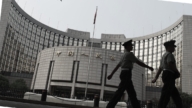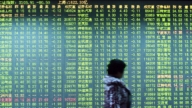【新唐人2013年07月25日讯】中国金融市场大闹钱荒后,最近中共推出的全面放开金融机构贷款利率管制,很受各界关注,民众甚至认为中共会实行金融改革,利率市场化了,甚至有人奢望中共往撤销外汇管制迈进,不过更多专家认为,这是一种假象,因为中共当局对存款利率的管制并没有放开。专家指出,放开贷款利率管制,是中共为了资助一些濒临倒闭的国营企业和地方政府,以及延缓经济困局的举措。
虽然中共央行宣布取消实施了长达十年之久的贷款利率下限,但是市场仍感到失望,因为对存款利率的管制依然没有放松。
北京“天则经济研究所”副所长冯兴元希望存款利率也能放开,存款利率放开的话,市场自由竞争会更充分,不过绩效不好的银行可能会增加成本。
北京天则经济研究所副所长冯兴元:“以前实际上也说过放开,金融当局说了一句话,但是实际放开没有,根本看不出来,当时只有农村社它是2.3上限限制,其他的银行这些金融业机构,利率都靠的比较近。”
《法国国际广播电台》引用专家的评论指出,中国银行的贷款利率市场化,短期不会对实质利率水平带来太大变化,因存款利率上限并未开放,显示金融机构定价能力并没有受到挑战,央行这项举措的象征意义大于实质。
美国《华尔街日报》撰文揭露中国利率市场化的假象。文章说,与其说允许银行下调贷款利率是在推进利率市场化,倒不如说是政府在安抚依赖负债的国有企业。负债累累的国有企业面临的压力,肯定会因为贷款利率下降而有所缓解。
报导说,中共领导人最近的一些口风暗示政策的重点发生了变化。上周国务院总理李克强表示,要避免经济的“大起大落”,使经济运行保持在合理区间;和经济增长率、就业水平等不滑出“下限”,物价涨幅等不超出“上限”。但报导认为,现在宣告“李克强经济学”的新时代来临可能还为时尚早。
旅美经济学家简天伦:“利率下限取消,对于一些国有企业,如果在面临倒闭或者利润比较差,这样可以减低一些大的国营企业的成本,再一个,现在中国的经济在放缓,这样等于降低一些(成本)来刺激经济,但是也可能掩盖了一些大企业效率低。”
旅美经济学家简天伦指出,放松贷款利率,直接受益的是那些有背景的大型国有企业,和那些能够摆布银行地方支行的地方政府。
简天伦:“中国现在贷款到处需求很多,不会出现贷款放松限制,中小企业收益的情况,也不会太多的改善银行间的竞争,短期来讲谁受益了——大的国营企业,或者是(地方)政府。”
对于银行来说,历来都是风险越高贷款利率越高,因此降低贷款利率对于竞争力不强,风险较大的中小企业来说,不会带来好处。他们还是只能从影子银行或地下钱庄借高利贷来维持生计。
美国南卡罗莱纳大学艾肯商学院教授谢田:“国有银行因为它的垄断地位,对中小企业,私有企业一直有歧视性的政策,中小企业,不管贷款利率下限取消也好,不取消也好,他们都是很难从国有银行拿到贷款的,唯有真正让金融市场,自由化,市场化,才能使中小企业得到钱,解决钱荒的问题。”
虽然央行取消了贷款利率下限,但是银行也不会从放开利率中受益。
《华尔街日报》认为,即使不降低贷款利率,银行也照样有生意,影子银行也不会因此而受到影响,最近影子银行业务呈爆炸性增长,表明银行仍有机会以更高的利率向新的借款人贷款。中共当局应该吸取的教训是,只要有规定,市场就会千方百计的去绕开规定。
这时候,投资者们应该警惕的,或许是那些对中国金融行业的压制可能带来的新隐患,如:企业破产、政府救助,也可能是利率的再一次飙升等。
采访编辑/刘惠 后制/王明宇
Who Will Benefit From Liberation of Loan Interest Rates in China?
The Chinese financial market has
been in great shortage of money.
Recently, the Chinese Communist Party
(CCP) launched a full liberalization of loan
interest rates for financial institution regulation.
This has gathered international attention.
Some observers think that the CCP will implement
financial reform, with loan interest rates marketized.
Some expect the CCP to withdraw
foreign currency control in the future.
Other experts believe this is an illusion,
because the Chinese authorities did
not relinquish control on deposit rates.
Experts highlight that liberalization of loan interest
rate controls will finance the nearly bankrupt
state-owned enterprises and local governments.
It will slow down economic difficulties.
The CCP central bank announced cancellation
of decade-long lower limit loan interest rates.
However, the market is still disappointed, as
the deposit rate control is still not relinquished.
Feng Xingyuan, Deputy Director of Beijing Tianze Institute of
Economics, hopes deposit rate control can be relinquished.
If so, free market competition will be more comprehensive,
but the poor performance banks may increase their costs.
Feng Xingyuan: “It has actually been
said before that it would be liberalized.
The financial authorities said this,
but it was actually not liberalized.
There were no actions.
It was a 2.3 upper limit in rural communities,
and other banks and financial institutions
interest rates are relatively close to each other."
Radio France Internationale quoted experts commentaries.
The marketization of Chinese banks’ loan interest rates
will not change the real interest rates in the short term.
This is because the deposit interest rate cap is not liberated.
This showing the ability of financial institutions
to determine pricing has not been challenged.
This initiative of the central bank
is more symbolic than substantive.
The Wall Street Journal discussed the
illusion of market interest rates in China.
It said that allowing banks to lower loan interest
rates is to appease state-owned enterprises,
rather than promote interest rate marketization.
These enterprises are dependent on loans,
Pressure on heavily debt ridden state-owned enterprises
will certainly be eased by lowering loan interest rates.
It has been reported that some Chinese leaders
recently hinted their policy priorities have changed.
Premier Li Keqiang spoke last week about
avoiding economic ups and downs, and to
maintain the economy at a reasonable level.
This will involve economic growth, and to ensure
employment levels will not drop below the lower limit,
and for price increases to not exceed upper limits.
However, reports said that it was too early to
announce a new era of Li Keqiang economics.
Jian Tianlun, US-based economist:"Loan interest rates
lower limit cancellation will reduce the costs for some state-owned enterprises
who are facing bankruptcy or making little profit.
It will reduce some costs, and stimulate the economy,
but will also cover up inefficiencies in large enterprises."
Jian Tianlun highlights that liberating loan interest rates
will directly benefit those large state-owned enterprises.
It will also benefit the local governments,
which can manipulate local bank branches.
Jian Tianlun: “China now has much demand for loans.
SME revenue will not improve by liberating loan interest
limits, nor will it ease competition among banks.
In the short term, who will benefit from this? It is large
state-owned enterprises, or the (local) governments."
For banks, the higher the risk,
the higher the loan interest rates.
Reducing loan interest rates will not bring benefits
for the less competitive and more risky SME’s.
They can still get usury loans from the shadow banks,
or illegal private banks, to maintain their livelihoods.
Professor Xie Tian, School of Business,
University of South Carolina- Aiken:
“Because of the monopoly of state-owned banks, it has
discriminatory polices towards SMEs and private companies.
No matter whether the lower limit of loan interest
rates are cancelled or not, they all find it very
difficult to get loans from state-owned banks.
Only if the finance is marketized, can SMEs get
money to solve their problems of shortage of money."
Although the central bank canceled lower limits
on loan interest rates, banks will not benefit
from the interest rate liberalization either.
The Wall Street Journal believes that if the banks don’t
lower loan interest rates, they will still have business.
Shadow banks will not be affected either.
Recently the explosive growth of shadow banking
showed that banks still have a chance to lend
money at a higher interest rate to new borrowers.
The Chinese authorities should draw a lesson.
As long as there are provisions, the market
will do everything possible to circumvent them.
At this time, investors should be wary of the new risks,
because of the suppression of China’s financial industry.
This includes corporate bankruptcies,
as well as government bailouts.
This may once again cause interest rates to soar.




























